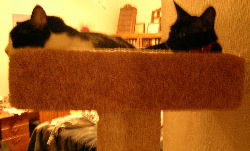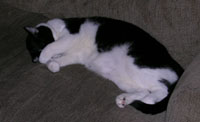Self Defense 101.1After having prepared a dinner that was so bad that no one ate more than 3 bites (no one’s fault; the meat was pre-marinated), the Spouse Thingy and I headed for WalMart to buy kitty litter (immediate odor control, thanks to whatever crawled up inside Buddah and died…) And while we were there we figured what the heck, there’s a McD’s right there, we might as well eat
something.
At the table behind us there was a family with two younger kids; they were extremely well behaved and were carrying on non-whiny conversations. Mostly it was background noise that was noticeable simply because the kids were small but happily talkative. And the parents were paying attention to what their kids were saying, even giving consideration to their son’s thought that someone needs to get a really big airplane and bomb all the mean people off the face of the earth.
Yeah, a little too young to understand irony, I think.
But what caught my attention, and made me want to get up and talk to the parents was something very innocent, but borderline terrifying. The only thing that kept me in my seat was knowing I would scare their kids.
Teaching your kids their names, phone numbers, addresses, etc, is a
very good idea. Going over that information is essential: drill it in so they know it when they need it. Make it so ingrained that they can cough it up even when under stress.
But people…don’t, not ever, go over that information in a public place. I was sitting right behind them, I could hear their little girl saying her full name, her phone number, the street she lived on, and the house number. If I had ill intents toward kids, I’d know where to find one very adorable little girl and a sweet little boy.
I wanted to turn around and let the parents know that; I wanted to let them know the ramifications of strangers overhearing that information, but the kids were there, and I didn’t want to scare the kids.
The whole thing reminded me of something else, I note I’d read on a newsgroup years ago. One of the NG’s participants was quite proud of herself; she was in her yard and noticed a very young kid (I can’t recall gender, but for this, let’s just say it was a little boy…) looking miserably frightened on the sidewalk. She asked if he was ok, and quickly learned that he was lost, only knew his first name, didn’t know his mother’s first name, nor his address or phone number. She sat him down on her front steps, and said she would call the police, and they would find his home.
The kid freaked out. He didn’t want her to call the police—that would mean he was in big trouble. So she acquiesced; she didn’t call the police. Instead, she put him in her car and drove up and down the streets until he recognized his house.
Alls well that ends well?
One would think. However… she was extremely proud of having helped the kid find his way home, and was angry beyond coherent words when I surmised that she’d done the entirely wrong thing. Yes, I pooped on her parade. I peed in her Cheerios. But I had to.
You don’t want to frighten kids, but there are times when the adult has to
be an adult; she needed to let him cry and worry about getting into trouble and call the police no matter what he wanted. This kid needed to see that the police are there for his benefit, not his terror. He needed to understand that when you’re in trouble, they’re there to help you, not hurt you.
She also put him in her car; this kid now had the impression that it’s okay to get into a car with a perfect stranger. After all, he did it before and it turned out all right. The nice lady helped him find his mommy.
But next time he might not be so lucky. Next time it might be a predator who offers him the ride home. Next time he might not live to see life beyond the next 5 minutes.
Our intentions towards the kids around us are usually pretty good. But we’re the grown ups. We have to
think. We have to follow point A to point B and reason out the possibilities in between. We have to pay attention to our surroundings—who might be listening in on the things we’re discussing with our kids—and we have to gauge what we do accordingly to protect them. We have to stop and consider what taking the easy way out might mean for their future. We have to make the grown up decisions based on not just the immediate safety of these kids, but their future safety as well.
If that means making a kid cry hard because the police are coming, so be it. Better that that the lesson that strangers are okay. If that means waiting until in the privacy of a car or home to go over personal information that can definitely help a kid out of a jam, then wait.
Stop.
Look around.
Think.
The people to whom we keep saying “act your age” depend on it.



 They’re sleeping together.
They’re sleeping together.
 This is a head I once grew.
This is a head I once grew.
 He’s feeling fine, but it was time for follow-up blood work.
He’s feeling fine, but it was time for follow-up blood work.